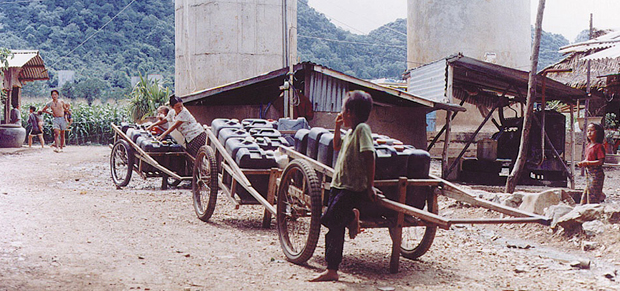By Tim Montgomery
The State Department's announcement in December that a large population of Hmong refugees living at Wat Tham Krabok, Thailand, would be allowed to immigrate to the United States stirs the imagination.
Let's imagine, for instance, that the Cold war were still on. Through its Cuban surrogates, the Soviet Union attacks the United States. Privately owned businesses and homes are burned, and people are forced to flee in order to save their families.
One day a firefight erupts in your neighborhood and mortars crash into your residence, setting it ablaze. You're forced to grab what you can and get your family out fast. You join others in a long trek through cornfields and forests toward the Canadian border. Finally, you swim the Rainy River and make your way to a U.N. refugee center in Ontario with nothing but the shirt on your back.
That's how many Hmong ended up in Thailand - with only the shirts on their backs, if that. Family members were lost during the long trek to escape death in Laos. The only support many could draw strength from was their common experience, until such time as they could be reunited with their families and return to their homes across the border in Laos.
It would be nice to stay in Canada until a time when you could return to your home accross the border in the United States. The language and culture are similar, and you have friends living in Thunder Bay. But that isn't an option. Resettling overseas in Japan is the only alternative being offered. You're left with the choice of adapting to a new culture abroad, or quietly slipping off into the countryside to find friends and family and live illegally in Canada.
The people living in the Hmong village at Wat Tham Krabok elected to try and make a new life for themselves in a familiar setting. They slipped off into the countryside and established their own village under the protection of the temple prelate. For the Hmong living there, Wat Tham Krabok is an outpost held against the hope that they could preserve the only way of life they've ever known. And the elder residents who first established their families there did indeed continue the lifestyle they had known in Laos.
But ensuing generations have found no future for themselves in this life. Though these are the families of Hmong soldiers who fought for the United States during the Vietnam War, they receive no veterans benefits. New generations continue to be born with no official paperwork to establish any citizenship rights, and education and employment opportunities are severely limited.
Heavily burdened with refugee populations from wars across its borders with Cambodia, Laos and Myanmar (Burma), Thailand has struggled for years to resolve the problem of people living illegally in the country, finally deciding on a policy of containment for the larger populations.
For the people in the Hmong village at Wat Tham Krabok, this is their reality. Their village has become a prison. They need our help and our understanding.
This commentary, published in the Minneapolis Star Tribune daily newspaper, was accompanied by 2 photos by Joey McLeister. (Photo above by Tim Montgomery)

